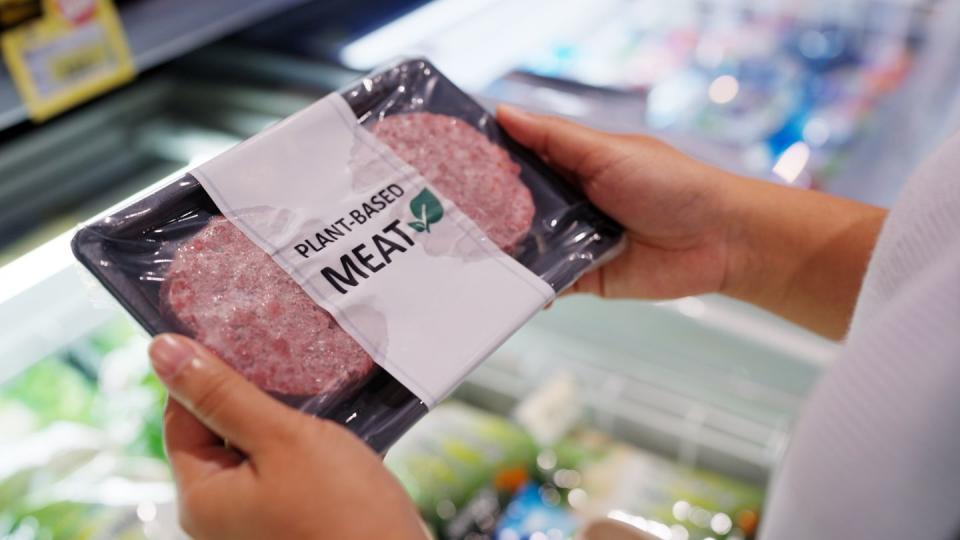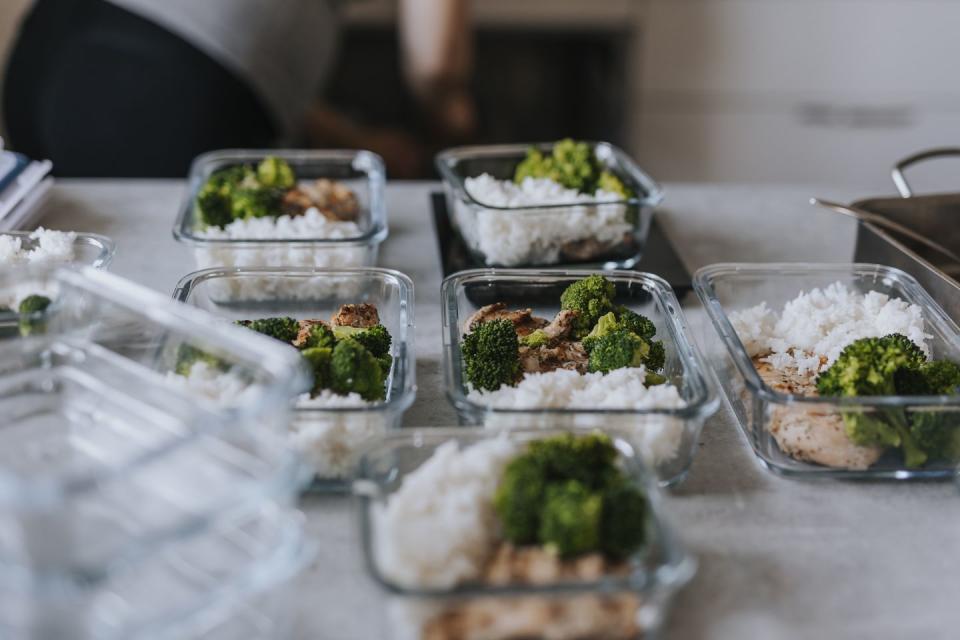What does being 'plant-based' actually mean?

Plant-based diets are on a meteoric rise. According to data from a 2020 study, there has been significant increase in searches related to vegan and vegetarian diets over the past decade, indicating an ever-growing interest and awareness among the public. The UK food delivery service, Deliveroo, also reported a 115% increase in demand for plant-based meals between 2019-2021.
And with Public Health Nutrition linking plant-based diets to many health benefits, including; weight management, reduced risk of chronic diseases and improved overall well-being, it’s clear people are adopting a plant-based diet for nutritional reasons.
But don’t confuse ‘plant-based’ with vegan – they’re not the same thing. Enjoying a plant-based diet simply means eating more plants and fewer animal products (not ruling them out altogether).
Still confused? Don’t be. We’ve asked the experts all your burning questions. From ‘what is a plant-based diet?’ to ‘what are the benefits of a plant-based diet?’ – here’s everything you need to know.
What is a plant-based diet?
A plant-based diet is what it sounds like – a diet that consists mostly of foods that are derived from plants.
‘Plant-based refers to a diet or lifestyle that primarily consists of foods derived from plants including not only fruits and vegetables but also nuts, seeds, oil, whole grains, legumes, and beans,’ explains UK’s leading nutritionist and author of The Science of Plant-based Nutrition (£20, out on 27 June 2024), Rhiannon Lambert.
You may hear people talking about ‘whole food, plant-based’ diets. Eating this way means focusing on primarily minimally processed plant foods, and avoiding things that are vegan but not healthy, as such – think ultra-processed vegan biscuits and cakes or meat alternative products, like veggie sausages.
Wait, so what’s the difference between vegan and plant-based?
While these terms are often used interchangeably, there are some key differences. Plant-based diets can include animal products, on occasion, whereas a vegan diet never does – they have made a firm ethical choice to stay away from anything animal-derived.
‘Instead of adhering to a strict set of rules, a plant-based diet allows for various dietary combinations. It can include or exclude animal-derived products based on preference but primarily focuses on foods from plant sources,’ confirms Lambert.
Also, plant-based diets refer solely to someone’s food intake whereas veganism is often a wider lifestyle choice, affecting beauty products (not using things tested on animals) and clothing choices (avoiding leather, for example.)
‘A plant-based diet is more flexible and can vary from individual to individual and is typically motivated by the health benefits associated with consuming more plants for overall well-being. A vegan diet extends beyond diet to encompass a lifestyle that seeks to avoid the exploitation and harm of animals. The primary motivation for veganism is often ethical, focusing on animal rights and welfare, as well as environmental concerns related to animal agriculture,’ adds Lambert.
What are plant-based foods?
Fruits
Vegetables
Wholegrains, like quinoa, brown rice and barley
Nuts and seeds
Plant-based oils, like olive and avocado
With careful planning, you should be able to get everything you need, nutrient-wise, from a plant-based diet, says nutritionist Angelique Panagos. ‘Be conscious to eat the rainbow — a whole range of colourful vegetables — and ensure half of every meal is non-starchy veg, just over a quarter is protein and the remainder is complex carbs.’
Though we typically think of meat and fish as protein sources, you can get it from beans, quinoa, seitan, tempeh, lentils or tofu. As mentioned, being ‘plant-based’ doesn't necessarily mean that you never eat anything that is animal-derived. So, some people who call themselves ‘plant-based’ might factor in having eggs once a week, for example.

What are the pros of a plant-based diet?
‘A plant-based diet offers numerous health benefits, which can contribute to overall well-being and reduce the risk of various diseases,’ says Lambert.
‘Extensive research suggests that a plant-based diet can enhance longevity and lower the risk of certain health conditions such as cardiovascular disease, type 2 diabetes and some cancers.’
Here are some of the key benefits...
1. Increased longevity
Some evidence indicates that cutting down on meat and animal consumption will help you live longer. A study on 12,168 middle-aged people in the United States over 29 years found a plant-based diet can lower the risk of early death by up to 25%. It’s also been found that certain societies with plant-based diets are more likely to live past 70 years old.
2. Doing your part for the environment
Eating predominantly plants, rather than animals who eat plants, has wide-ranging eco benefits. Research shows a quarter of global emissions come from food and, of those, more than half come from animal products.
‘We're not telling people to stop eating meat. In some places, people have no other choice. But it's obvious that in the West we're eating far too much,’ said Prof Pete Smith, an environmental scientist from Aberdeen University.
3. You might decrease your chance of heart disease
Unsurprising maybe, given the link between high meat consumption and heart disease, swapping in more plants has been shown to lower the risk of heart disease by 16%.
Meat contains a lot of cholesterol and saturated fat, both of which are linked to heart disease. Process meats like deli meat, salami, bacon and sausages also contain high levels of salt, which can lead to high blood pressure.
4. Could lower your risk of type 2 diabetes
By encouraging a healthy diet, going plant-based has been shown in some studies to help prevent and treat type 2 diabetes by controlling insulin production and weight.
A 2006 study found a high-quality plant-based diet reduced the chances of developing type 2 diabetes by 34%.
5. You might save cash
Even if you splash out at Whole Foods, odds are a plant-based diet will be cheaper than shopping for meat. Cut your food budget even further by buying frozen veg, which has pretty much the same amount of nutrients as the fresh stuff.
6. You could lower your blood pressure
A range of studies have shown a healthy plant-based diet can have a positive effect on blood pressure. One saw a 34% reduced risk of developing hypertension and another showed a reduced chance of strokes, heart attacks and overall mortality even when a small amount of meat and dairy was consumed.
7. You could have more energy
Evidence suggests a plant-based diet can work wonders on our energy levels.
8. You could up your workouts
As well as boosted energy levels, athletes have reported performance benefits of switching to a plant-based diet. Research has shown cutting meat from a diet has no downsides to physical performance. Furthermore, it suggests the rise in plant nutrients and decrease in processed foods have positive effects on oxidative stress and endurance.
9. You could improve your gut health
‘One health benefit of plant-based eating is the increased consumption of a key nutrient, fibre,’ says Lambert. ‘Consuming a wide variety of plant-based foods can help you achieve the recommended 30g of fibre per day, which is proven to support a healthy gut microbiome. Furthermore, studies indicate that a high-fibre diet can improve blood sugar and cholesterol levels while fibre from whole grain sources has also been linked to a reduced risk of non-communicable diseases.’

What are the cons of a plant-based diet?
1. High sugar and salt levels
If you’re not careful, switching to a plant-based diet can increase your salt and sugar intake as a lot of the alternatives are surprisingly packed. An Action on Salt survey found nearly two in five plant-based meals sold in the UK were found to contain more than 3g of salt per 100g, which is classed as high salt. Just make sure you read the label or, ideally, stick to predominantly whole foods and keep processed products to a minimum.
2. There's a chance of nutrient reduction
It's just about being conscious of getting everything we need, which is always important when starting a diet that cuts out certain food groups. ‘For example, a steak is full of iron, selenium, vitamin B12, niacin and zinc, plus it has a high bioavailability, meaning the nutrients enter the body easily and quickly,’ says Harrison. ‘If you want to get approximately the same amount of nutrients as a steak but in plant form, it's simple but your meal will look different.’
‘Without careful selection, a plant-based diet can include unhealthy choices and pose a risk of nutritional deficiencies,’ adds Lambert. ‘Additionally, some individuals may experience digestive discomfort following a high-fibre diet especially if fibre intake is increased rapidly. Therefore it is important to slowly introduce any dietary changes such as increasing your intake of plants.’
3. It’s a test of willpower
Some people do just love meat, so will obviously find the transition rather tricky, while others are surprised how easy it is. ‘A top tip for transitioning to a more plant-based diet is to try going meat-free for one day of the week’, says Harrison. ‘If you enjoy being plant-based, then keep it up. If you don’t, try and stick to just a few days meat-free a week.’
Are there specific nutrients you need to be careful of getting enough of?
Though it’s totally possible to get everything you need from a plant-based diet, but ‘we should be watching are vitamin D, B12, iron and omega-3’, says Harrison, as they’re important for the healthy functioning of our bodies – and can easily drop without meat and dairy.
Vitamin D
We normally get this from the sun however, in colder parts of the UK and when the evenings get darker, vitamin D becomes harder to get. You can get it from fortified foods, such as milk or cereal, and mushrooms, or supplements.
Vitamin B12
This is a water-soluble vitamin which is involved with every cell in the body, so it’s vital for keeping the nerve and blood cells. 92% of vegans and plant-based eaters have B12 deficiency, so be careful to get enough. As well as meat and dairy, B12 is found in some fortified plant milks as well as supplements.
Iron
Iron-rich plant-based foods include lentils, tofu, cashew nuts and chia seeds. It’s important for blood formation, in particular haemoglobin production, however, it can’t be absorbed unless there is plenty of vitamin C to help.
Omega-3
Essential for preventing and managing heart disease and high blood pressure, omega-3 can be found in walnuts, chia seeds and flax seeds. You can also buy plant-based supplements.
Can a plant-based diet safely aid weight loss?
If you are overweight and are looking to get to a different BMI, know that upped levels of fruit and veg, and lower sat fats from meat, can lead to weight loss. One study saw 65 overweight adults on a plant-based diet for one year lose an average of 4.2kg. ‘Another reason why plant foods aid weight loss’, says Harrison, ‘is most vegetables have a low glycemic index which means they are digested more slowly and high fibre in the fruits and vegetables keeps you fuller for longer.’
However, as with any diet choice, a reason for going plant-based shouldn't be purely to lose weight. There are many other benefits. And, as with all ways of eating, it will depend on how you specifically manage your diet.

What does a plant-based meal plan look like?
We spoke to nutritionist Jenna Hope for her example of a balanced daily intake...
Breakfast
Smashed avocado with chilli and lime on wholemeal or rye toast topped with roasted chickpeas
Snack 1
Chopped pear with cashew butter and sprinkled with cinnamon
Lunch
Quinoa salad with roasted peppers, onions and courgettes topped with a tahini dressing
Dinner
Baked tofu served with steamed greens and brown rice
Snack 2
Hummus with carrots and cucumber or spread on oat cakes

5 easy ways to eat a plant-based diet
There are plenty of ways to add more plants to your diet. Here Rhiannon Lambert gives us her top-tips for tweaking your diet and gradually building up the number of meat-free meals you eat each week...
Replace meat with plant proteins in a few meals: try using beans, lentils, tofu,tempeh, or chickpeas instead of meat. For example, substitute ground beef in tacos for black beans or lentils.
Opt for whole grains: choose whole grains such as quinoa, brown rice, and whole wheat bread instead of refined grains. For example, make a quinoa salad or red lentil pasta salad instead of pasta salad. Whole grains count as a plant point whereas white, refined pastas and grains (such as white pasta and rice) do not.
Incorporate more fruits and vegetables: aim to fill half of your plate with fruits and vegetables at each meal. For example, add a handful of spinach to your morning omelette or enjoy a fruit salad as a snack.
Snack on nuts and seeds: opt for nuts, seeds or 100% nut butter as snacks instead of processed snacks such as crisps. For example, enjoy a handful of almonds to spread peanut butter on apple slices as an afternoon snack.
Use plant-based oils and spreads: replace butter with plant-based oils like olive oil, avocado oil or spreads made from nuts and seeds. For example, use olive oil instead of butter for sauteing vegetables or spread avocado or hummus on toast instead of butter.
Remember: Dietary changes should always happen slowly – don’t make any drastic changes overnight.
Cut through the noise and get practical, expert advice, home workouts, easy nutrition and more direct to your inbox. Sign up to the WOMEN'S HEALTH NEWSLETTER
You Might Also Like


